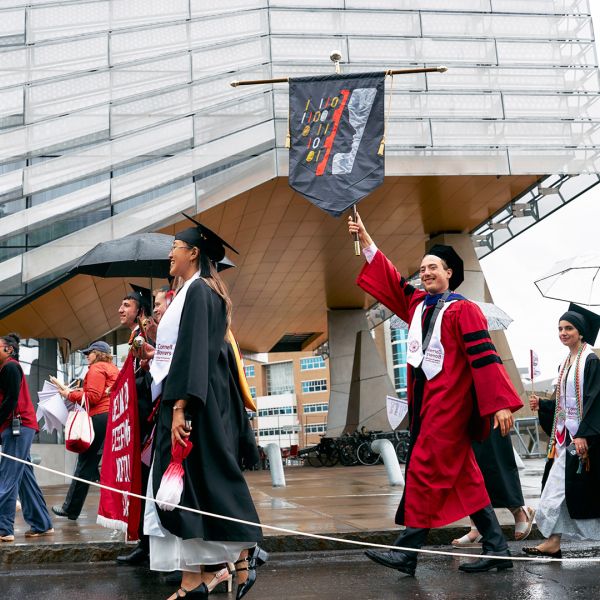June 2, 2025
By Louis DiPietro and Patricia Waldron
The largest ever graduating class in the history of the Cornell Ann S. Bowers College of Computing and Information Science – more than 1,400 in total – walked the stage in three recognition ceremonies held May 23 and 24 at Barton Hall.
Cornell Bowers is “a community that embraces the new frontier of technology and the promise it holds to advance our world,” said Thorsten Joachims, interim dean of Cornell Bowers. “Today, as you cross this stage, you do so not only as graduates, but as stewards of this legacy.”
Held each year around university Commencement – where graduates formally accept their degrees – the recognition ceremonies are opportunities for each of Cornell Bowers’ three departments of computer science, information science, and statistics and data science to honor their own graduates. Each ceremony recognized students graduating in December 2024, May 2025, and August 2025.
Joachims urged the class of 2025 to continue to work for the greater good.
“As we look to your futures …it is important to acknowledge, perhaps especially in this moment, the crucial responsibility that universities like Cornell shoulder in furthering not only the exploration of complex questions that emerge but also the pursuit of answers and solutions to make a difference in our world,” Joachims said. “As you go forward, we are confident you will carry what you’ve learned into the world and continue the work of driving positive change through technology.”
Statistics and Data Science
In his remarks at the department ceremony Friday morning, James Booth, department chair and professor, said the time has arrived for the class of 2025 to apply what they’ve learned at Cornell and make a positive impact.
“Keep your eyes open to recognize the opportunities that good fortune will inevitably put in your paths and weather life’s challenges by staying resilient and avoiding obstacles,” he said. “And treat others at all stations of life with dignity and respect.”
Information Science
David Mimno, department chair and associate professor, did not sugar-coat his message: information science faculty made graduates do a lot of work in their time at Cornell. That’s what training is, he said, but education is something different.
“Education is knowing which skill you should apply in a new situation,” he said.
He encouraged graduates to tell the story of Cornell's Department of Information Science through their excellence.
“We are training doers. We are training integrators,” he said. “We are training the leaders of a world that does not yet quite exist.”
Chris Csíkszentmihályi, associate professor of information science, was chosen by the department's graduates to give the keynote address. He encouraged graduates to continue to nurture and build off the relationships, contributions, and hard thinking done at Cornell.
Highlighting graduates’ role in advancing research, Csíkszentmihályi said graduates are part of an institution built on continuous, incremental discovery, human expression, and evidence-based research.
“We know so much more than we did when Cornell started 150 years ago,” he said. “Back then, cholera was caused by bad smells; humans couldn’t survive moving more than 30 miles per hour. Women couldn’t vote.”
On the cusp of a global, artificial intelligence revolution, he advised graduates to not give up on thinking for themselves – “keep working out your brain” and to “put in your reps.”
“Your brain is a temple. Exercise discipline. Build and challenge it every day,” Csíkszentmihályi said. “You’re a Homo sapien. You’re a Cornell Bowers Information Science graduate! Take some responsibility.”
Computer Science
The Department of Computer Science celebrated its class of 2025 graduates in a packed Barton Hall.
Lorenzo Alvisi, M.S. ’94, Ph.D. ’96, the Tisch University Professor in Computer Science and chair of the Department of Computer Science, addressed the audience, comparing Cornell’s founding principle of “…any person …any study” to Chef Gusteau’s motto from the movie Ratatouille: “anyone can cook.”
“Not that everyone can cook – rather, that a great cook can come from anywhere!” Alvisi said.
Like becoming a great chef, a Cornell education is made possible by learning from experts who are at the vanguard of their field and who are also passionate about sharing their secrets.
This “miracle of American higher education” is made possible by the agreement between the federal government and academia, where federal grants support innovative, pioneering research and train the future workforce, he said. This agreement, which dates to the establishment of land-grant institutions, has advanced the idea that “knowledge should be accessible and serve the public,” Alvisi said. “‘To do’, in Cornell’s words, ‘the greatest good.’”
As examples, he pointed to past department discoveries that led to the origins of cloud computing, enabled the searching of documents on the web, and developed the science of social networking, as well as current work that is laying the foundation for the ethical and responsible development of artificial intelligence.
Alvisi urged the graduates to communicate the importance of this “miracle,” and help maintain U.S. leadership in science and technology.
“The educational experience one lives at a top American university like Cornell, whether as undergraduate, masters, or Ph.D. student, is unique in the world," Alvisi said. "Help preserve and protect it for future generations, and with it the rich fruits it has been bearing for the nation and the world.”
Louis DiPietro and Patricia Waldron are writers in the Cornell Ann S. Bowers College of Computing and Information Science.



